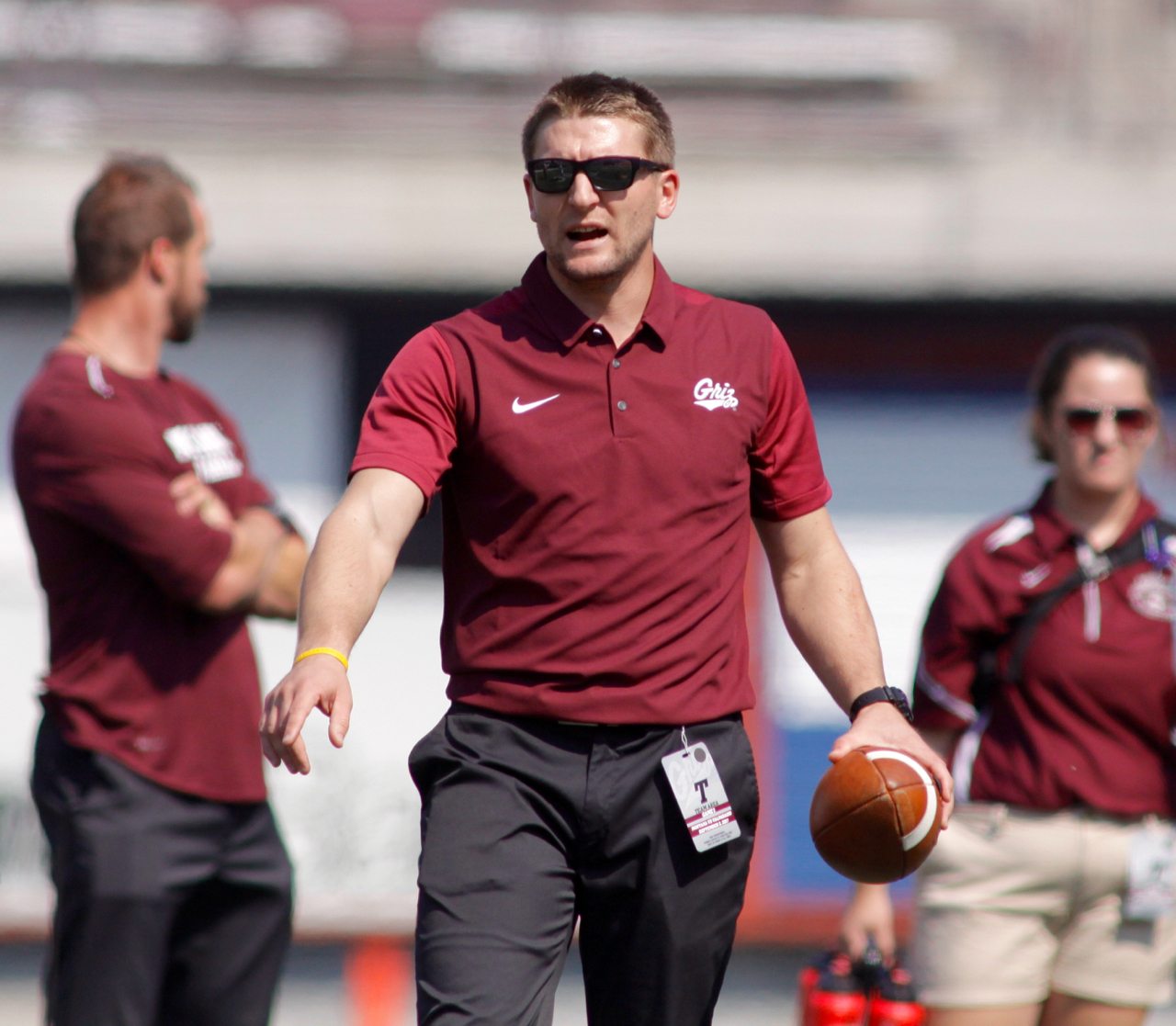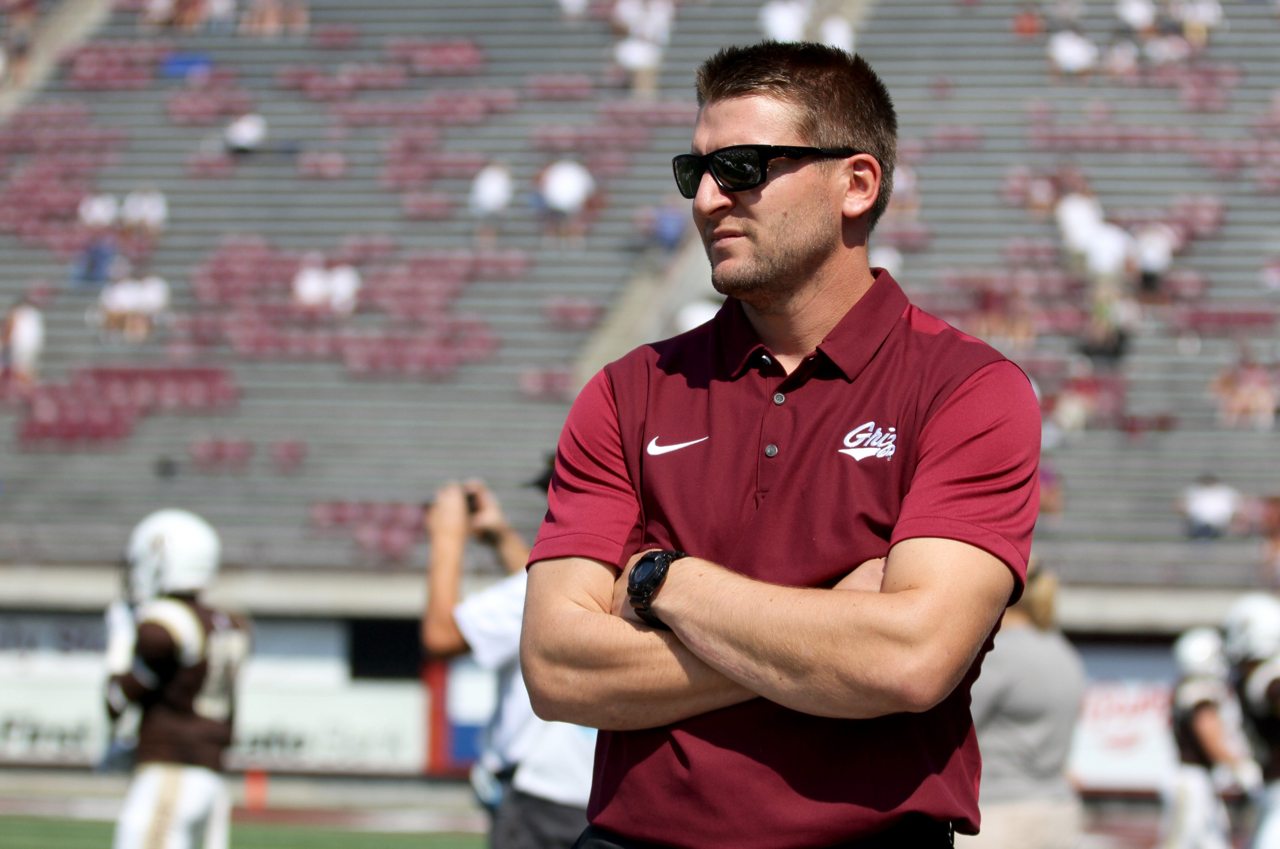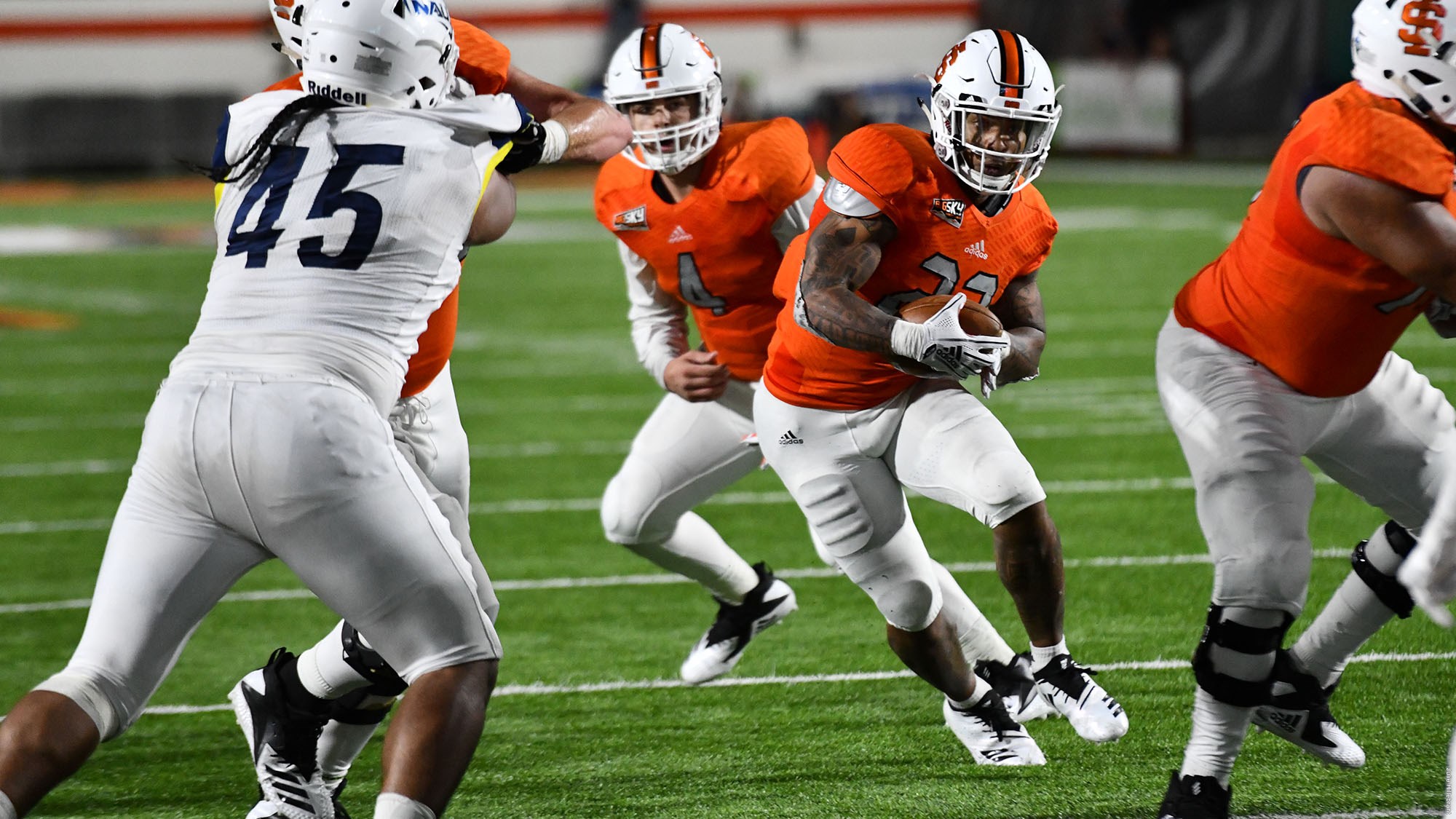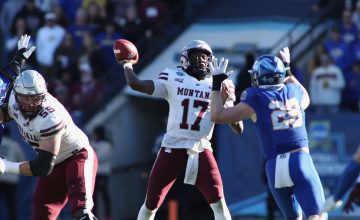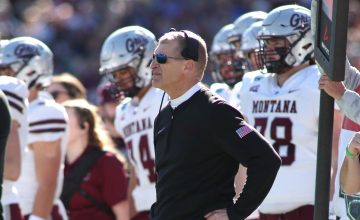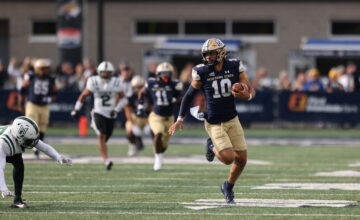Mike Ferriter wasn’t expecting to go into coaching when his playing career ended.
Ferriter, one of the greatest wide receivers in Montana history, was a human biology major, and planned to get into the health sciences after taking a year off after his graduation.
But, ironically, it was his own health that pushed him down a different path.
“I took a year off to kind of get everything in order and study for some tests and apply to some schools, and I was diagnosed with testicular cancer,” Ferriter said. “So, that kind of just threw me a little bit of a curveball. I didn’t really know what I was going to do. It obviously set me back, shook a lot of things up, you know. My whole life, things had been, for the most part, pretty smooth.”
One day, while he was in chemotherapy, Ferriter got a call from his old college coach and offensive coordinator, Bobby Hauck and Rob Phenicie.
The duo had moved on from Montana and was now coaching at UNLV, but they had a proposition for Ferriter — an open graduate assistant position that they wanted to offer him.
Would he be interested?
“It was something I never really planned on doing, [but] I do believe things happen for a reason, and I think the cancer scare was my sign to get into coaching,” Ferriter said. “Now, I can’t imagine doing anything else other than coaching college football.”
Now fully healthy — and a year removed from a three-year stint as Montana’s receivers coach — Ferriter is Idaho State’s offensive coordinator and one of the hottest young coaching prospects in the Big Sky.
Along with Phenicie, the Bengals’ head coach, he’s designed the offense that has made Idaho State one of the early-season surprises in the league.
Picked 12th, or next-to-last, in the preseason coaches’ poll, the Bengals are instead 3-1, with back-to-back wins over conference opponents North Dakota and Northern Arizona and a crucial in-state showdown with Idaho on tap for this week.
“I think as a team, we just show up and go to work,” Ferriter said. “We’ve got to continue to improve, and in the first four games of our season, there were a lot of things that we can continue to work on and improve on. We definitely noticed that we were picked 12th in the preseason polls by the coaches and the Big Sky Conference. That’s things that you notice, and things that we use as motivation to fuel our guys every day, to not be that team.”
The rise has been partially fueled by an offense that is fourth in the conference in both scoring and total offense.
In Ferriter’s first year as coordinator, the Bengals are averaging 37.2 points through four games.
They’ve done it with a brutally effective running game that’s averaging 240.5 yards per, one of only three teams in the conference to break the 200-yard mark.
James Madison has 429 yards and is tied for the Big Sky lead with seven touchdowns, while Ty Flanagan is also on the list of top-10 rushers in the Big Sky with 334 yards.
Ferriter didn’t set out to create a monster run game when he got to Idaho State, but when he looked at the personnel he had, he realized that was his best option, and adapted accordingly.
“The first thing that jumped out to me was that I thought we had two very good running backs and then an experienced offensive line,” Ferriter said. “I think we had to use that to our advantage and kind of put the ball in those guys’ hands a little bit. Now, being an ex-receiver, I still like to throw the ball around, but we’ve got to pick and choose where we’re going to do that and how we’re going to get that accomplished.”
That willingness to adapt has helped Ferriter in his journey to becoming a coach.
According to Phenicie, who was Ferriter’s offensive coordinator as a player at Montana and as a GA at UNLV, and is now his head coach at Idaho State, Ferriter’s curiosity also helps.
“What I like about Mike Ferriter is, he would question me,” Phenicie said. “It’s hard to explain, but it’s different. I know I’m the head coach, but when we are in an offensive staff meeting, I’m the receivers coach. We’ll sit and talk about things and Mike is not afraid to call me out on stuff, which I love.”
Although he said he never considered it, Ferriter’s early career perfectly laid the foundation for his introduction into coaching.He was a quarterback in high school, running the offense for Helena High. At Montana, he was a smart, tough wide receiver learning under Hauck and Phenicie, at that time undoubtedly one of the top head coach-offensive coordinator pairs in the FCS.
He finished his Montana playing career with 147 catches for 2,089 yards and 15 touchdowns. All three marks are still in the top-15 all-time for the Griz.
Even with that background, Ferriter found it predictably hard to transition to coaching.
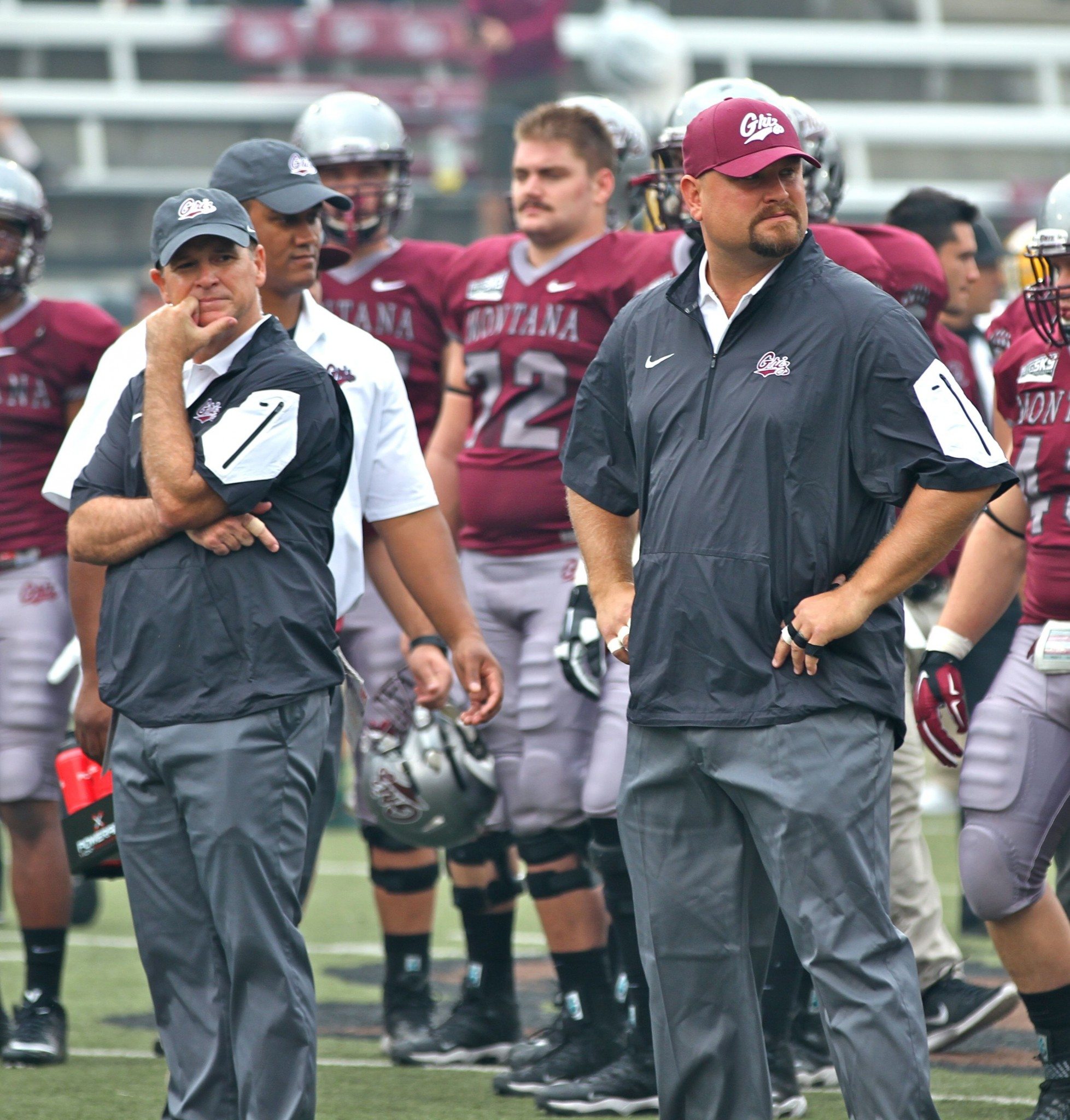
Former Montana head coach Bob Stitt with former defensive coordinator Ty Gregorak in 2015/by Brooks Nuanez
“You realize that you don’t know anything,” Ferriter said. “So, even as a player, you can play five years — and I felt like I was a really intelligent player — but when you first get thrown into the coaching world, you realize how little you actually know about the game and what actually goes into it. It was an experience, and it was challenging to figure that out and to figure out the work days that coaches put in.”
He spent two years under Hauck and Phenicie at UNLV before moving to Idaho State for the first time as a receivers coach in 2012.
He spent three years there before returning to Montana as part of Bob Stitt’s first staff in 2015, coaching the receivers again.
It was a unique opportunity — few coaches get the chance to return to their alma mater — and Ferriter still has fond memories of his time with the Griz.
“Bob Stitt was a great head coach and a great person that I learned a lot from, and I built a lot of relationships with the players there,” Ferriter said. “That’s the hardest thing of moving jobs, is you have to change the group of young men that you’ve kind of believed that you helped through some things and helped to become better players and better people.”
But when Hauck returned to Missoula this offseason, he opted not to keep his former player Ferriter on staff, replacing him with the more experienced Brent Pease.
Ferriter declined comment on Hauck, but, as with his cancer scare, losing one option opened up another.
Phenicie, who got to Idaho State as Ferriter was leaving in 2015 and was then named the head coach in 2017, wanted to work with Ferriter again — and make him his offensive coordinator.
Even if he had the chance to stay at Montana, Ferriter said, the opportunity would have been too much to pass up.
“I love Pocatello, I love Idaho State, it’s a great place for me, so not being retained was actually one of the best things that ever happened to me, because I was able to get this job,” Ferriter said. “Like I said, even if I happened to keep a job at Montana, this is a job that I would have left for in a heartbeat, to be a coordinator at Idaho State.”
So far, it’s been working out perfectly. With two conference wins in two tries, the Bengals already have as many as they’ve had in any year since 2014 — ironically, Ferriter’s last year in Pocatello.
And the accidental coach doesn’t plan to stop learning and getting better any time soon, either.
“It’s just like anything, to gain knowledge, you’ve got to research things and put in your time,” Ferriter said. “Over time, you start to learn, but I still feel like there’s a lot more out there that I’ve got to continue to learn and try to keep up to date, because there’s always new things coming in. So, you’ve just got to continue to work at it and try to be the best coach you can be.”

